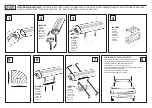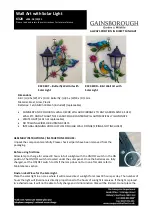
MSC..-1S..E
Supplement: MINI-SCREEN Models with Selectable Trip/Latch Output
2
P/N 68980
Banner Engineering Corp. • Minneapolis, MN U.S.A.
www.bannerengineering.com • Tel: 763.544.3164
In this document, section numbers or figure numbers are followed by the word
replacement
or
addition
. If a section is labeled a replacement, the information contained in that section
should replace the corresponding information within the primary manual (that section in the
primary manual should be ignored). If the section is labeled an addition, the material in the
primary manual is still valid and must be followed, in addition to the material contained in this
supplement.
The MSC..-1S2E and -1S3E control boxes have a “Trip/Latch Output Select” feature, instead
of the Auto Power-up feature on the models described in the primary manual. Any reference
to “Auto Power-up” in the primary instruction manual should now become “Trip Output” or be
replaced as follows:
“Auto Power-up is ON” becomes “Trip Output has been selected,” or
“Auto Power-up is OFF” becomes “Latch Output has been selected.”
Section 2. Addition
2. Overview of MINI-SCREEN System Operation
Remove reference to “Auto power-up (Section 2.2)” in the second bullet, and replace with
“Trip/Latch Output Select (Section 2.2(s)).”
Section 2.2 Replacement
2.2(s) Trip/Latch Output Select
The MSC..-1S..E control box can be configured for either Trip Output (automatic reset) or
Latch Output (monitored manual reset) via a pair of DIP switches located on the controller
module inside the control box. See Figure 18 in the primary instruction manual and Section
3.4(s) in this supplement.
Trip Output
Upon power-up, when the control box is configured for Trip Output, the FSD and SSD outputs
will automatically close once power is applied, the self-test is accomplished, and the defined
area is clear. If the defined area is blocked at power-up, only the SSD closes. The FSD
Outputs will close once the interruption of the defined area is removed (a Green condition). In
either case, no external input or reset is required.
Trip Output is typically used only in situations where the individual is continually sensed by
the defined area or in situations where supplemental safeguards prevent the initiation of
hazardous motion while an individual is within the safeguarded space. See Section 3.2.1.1(s)
Pass-Through Hazards.
When Trip Output is selected, recovering from a lockout condition will still require a manual
reset to be performed.
Latch Output
Upon power-up, when the control box is configured for Latch Output, the SSD output will
automatically close once power is applied and the self-test is accomplished.
For the FSD Outputs to close, the defined area must be clear of interruptions (a Green
condition) and a monitored manual reset must be accomplished (e.g., a key reset). To perform
a monitored manual reset, close the “Key 1 / Key 2” input for approximately ½ second, and
then re-open the input. The FSD outputs will close once the open-closed-open action occurs.
WARNING . . .
Initiation of
Dangerous Motion
Application of the MINI-SCREEN System
must not initiate dangerous machine motion.
Machine control circuitry must be designed
so that one or more initiation devices be
engaged to start the machine, after the
MINI-SCREEN is placed into Run mode (i.e.,
closes its FSD outputs).






























